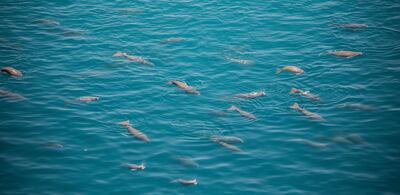A ban on fishing nets introduced in the UAE capital last winter has halved the dugong mortality rate, a study by the Environment Agency Abu Dhabi revealed.
The agency found 10 dugongs died in Abu Dhabi during the 2019-2020 winter season, compared with 23 in the same period last year.
It attributed the sharp drop in deaths to a December 2018 ban on surface fishing nets in the emirate.
The mammals cannot breathe underwater so must surface for air every few minutes. Consequently, they die quickly if they become entangled in nets, which are easily lost at sea.
Prior to the regulation, the dugong death rate rose annually and last season was the highest on record. Most were caused by drowning after they became trapped in nets.
“In 2018, the number of the deaths crossed a red line, so we said, ‘it stops here’,” said Ahmed Al Hashmi, acting executive director of terrestrial and marine biodiversity for the agency.
“At that time, we took strict actions and we banned all nets. This shows the very positive results of strict regulation and enforcement.”
This season’s records show the lowest dugong mortality rate in five years, with seven deaths caused by drowning.
Abu Dhabi has an estimated 3,000 dugongs, the second-highest population in the world after Australia. Most are found in the waters of Marawah Biosphere Marine Reserve, about 160 kilometres west of the capital.
The agency is now reviewing legislation on the protection of marine species and sustainable fishing.
Habitat degradation, marine pollution and collisions with speedboats are other causes of death.
“On social media, some people said we are speaking about very limited numbers of individuals,” Mr Al Hashmi said.
“However, if those numbers are repeated every year, how many deaths will we have? We’re talking about a population of 3,000 dugongs, so what per cent of the population will disappear?
“We’re not speaking about a small creature, we’re speaking about one of the largest marine animals in our waters. It’s iconic in Abu Dhabi – it’s in our traditions and our history.”
Arabella Willing, the marine biologist who conducted the autopsy on six dugongs found on Saadiyat Island last year, praised the government response.
“It was utterly devastating to find six dead dugongs washed ashore on Saadiyat in 2018, and I really commend the Environment Agency Abu Dhabi for their rapid response. It’s fantastic to see that the net ban has proven to be effective at protecting these magnificent creatures.”

Dugongs are herbivores and can eat 40 kilograms of seagrass a day.
They play an important role in the marine plant’s ecosystems.
“If you remove one species, you can’t predict what will happen,” Mr Al Hashmi said.
The use of banned fishing gear is punishable by fines of up to Dh50,000 and jail for first-time offenders.
Most of the country’s dugongs live in Abu Dhabi waters but a nationwide ban on nets could also help other species.
“It’s not a selective method of fishing, so you catch many non-commercial species of fish and marine life, like turtles,” Mr Al Hashmi said.
“If a fisherman responsible loses the net, it becomes a ghost net and sadly this is just a trap for dead fish. If a net is lost, it never disappears.”


